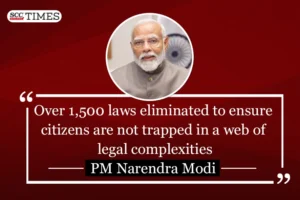From the Red Fort: On the 78th Independence Day, the Prime Minister of India, Narendra Modi addressed the nation with his speech from the Red Fort. The PM laid emphasis on the instrumentality of the Constitution in fortification of the Indian democracy in the past 75 years, since its enforcement.
The PM further elucidated that all the citizens were to fulfil their respective constitutional duties, everyone would become naturally become the guardian of another’s rights, because by fulfilling one’s responsibilities, they inherently protect the rights of others without any additional enforcement.
The PM then commemorated the new criminal laws- the Bharatiya Nyaya Sanhita, the Bharatiya Nagarik Suraksha Sanhita, and the Bharatiya Sakshya Adhiniyam, that came into force on 01-07-2024. He reminded the nation that the prime objective of the new criminal laws is to ensure justice for citizens, as opposed to the greater emphasis on reprimand and punishment of the erstwhile British-made laws.
With respect to the new criminal laws, the PM also indicated the Government’s interest in introducing a novel Civil Code, that might replace the existing Code of Civil Procedure, 1908. The PM described the current Civil Code as communal and discriminatory. He stated that, “laws that divide our nation based on religion and foster discrimination have no place in the modern society.” The PM invited the citizens to fulfil their collective responsibility to realise the vision of the framers of the Constitution. Therefore, PM Modi emphasised on the need of the country to move towards a Secular Civil Code.
The PM also advocated that the country should come together to welcome the concept of “One Nation One Election”.
On a concluding note, the Prime Minister accentuated that more than 1500 laws had been eliminated in the interest of the citizens, so that the latter are not entrapped into a web of legal complexities created by redundant laws.

